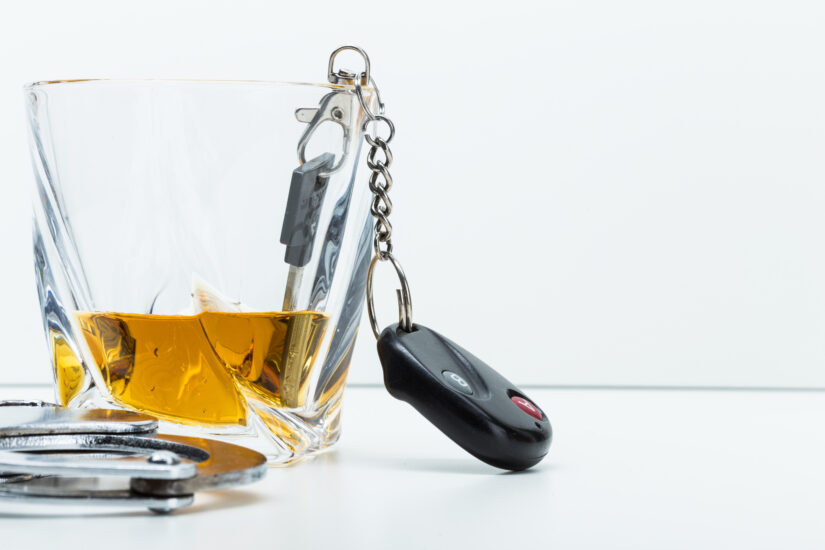
August 26, 2025
If you’re facing a 4th DWI in Texas, the penalties are severe. A fourth offense is usually classified as a third-degree felony, with potential prison time ranging from 2 to 10 years and fines up to $10,000. Aggravating factors, like prior felony convictions or causing injury, can elevate the charge to a second-degree felony, increasing the prison sentence to as much as 20 years. Additional consequences include:
- License suspension: 180 days to 2 years.
- Ignition interlock device (IID): Mandatory installation with associated costs.
- Financial penalties: State fines, court fees, and annual surcharges.
- Long-term effects: A felony record can impact employment, housing, and professional licenses.
Repeat offenders are labeled as habitual, facing stricter penalties and lifelong challenges. Seeking experienced legal representation is critical to navigating these charges and mitigating the impact on your future.
Criminal Penalties for a 4th DWI in Texas
Facing a fourth DWI charge in Texas comes with severe consequences, as the state imposes strict felony penalties to address the risks posed by repeat offenders.
Felony Classification and Prison Time
In Texas, a fourth DWI is typically classified as a third-degree felony under Texas Penal Code 49.09, with potential prison sentences ranging from 2 to 10 years. However, certain aggravating factors, such as prior felony convictions or causing serious injury, can elevate the charge to a second-degree felony, carrying a possible sentence of 2 to 20 years. For instance, in the case of Lewis v. State of Texas, the court upheld a 16-year prison sentence for a fourth DWI offense.
It’s important to note that Texas does not impose a time limit on prior DWI convictions. This means even older offenses—and those from other states—can be used to classify a fourth DWI as a felony.
These lengthy prison terms are accompanied by significant financial penalties.
Fines and Financial Costs
The financial repercussions of a fourth DWI are steep. Offenders face a maximum fine of $10,000, along with additional state-imposed fines, court costs, and fees for mandatory programs. Some of the key financial obligations include:
- State-assessed fines: An extra $3,000, $4,500, or $6,000 at sentencing
- Annual surcharge fees: Up to $2,000 per year to maintain your driver’s license
- Court and probation costs: Vary depending on the jurisdiction
- Alcohol and drug treatment program fees: Required as part of sentencing
Additionally, offenders are often required to install an ignition interlock device (IID), which comes with its own expenses. Monthly IID fees range from $65 to $95, and costs for enrollment, installation, and calibration can exceed $1,000 annually.
Beyond these financial burdens, driving privileges are also heavily restricted.
License Suspension and Ignition Interlock Requirements
A fourth DWI conviction severely impacts a person’s ability to drive. License suspensions typically last 180 days to 2 years, depending on the circumstances. For repeat offenders, the use of an IID is usually mandatory. This device requires a breath sample before the vehicle can start and periodically while driving.
Once the suspension ends, driving privileges may still be limited. Offenders might only be allowed to drive vehicles equipped with an IID or under an occupational license, which restricts driving to essential tasks like commuting to work, attending school, or going to medical appointments.
The combination of prison time, financial penalties, and driving restrictions makes a fourth DWI conviction a life-altering event in Texas.

Factors That Increase Penalties
Texas already imposes strict penalties for a fourth DWI, but certain aggravating factors can make the consequences even harsher. Understanding these factors is essential for anyone facing such charges, as they can significantly escalate both prison time and fines.
Common Factors That Worsen Penalties
Some circumstances can elevate a fourth DWI from a third-degree felony to a second-degree felony, bringing more severe penalties. These include:
- High Blood Alcohol Concentration (BAC): A BAC of 0.15% or higher leads to much stricter consequences.
- DWI with a Child Passenger: Driving under the influence with a child under 15 in the vehicle is classified as a state jail felony. This offense carries 6 months to 2 years in jail and fines up to $10,000.
- Causing Injury or Death: If the DWI results in serious bodily injury (intoxication assault) or death (intoxication manslaughter), the charges escalate significantly. Intoxication manslaughter, for example, is treated as a second-degree felony.
- Prior DWI Prison Sentences: A history of serving prison time for previous DWIs can elevate the charge to a second-degree felony.
- Refusing Required Tests: Failing to comply with mandatory tests also intensifies penalties.
These factors demonstrate how additional circumstances can amplify the consequences of a fourth DWI, making the penalties far more severe.
Standard vs. Increased Penalties Comparison
The contrast between standard penalties for a fourth DWI and those with aggravating factors is striking:
| Offense Type | Classification | Prison Sentence | Fine |
| Standard 4th DWI | 3rd Degree Felony | 2 to 10 years | Up to $10,000 |
| 4th DWI with Prior Prison Sentence | 2nd Degree Felony | 2 to 20 years | Up to $10,000 |
| Intoxication Assault | 3rd Degree Felony | 2 to 10 years | Up to $10,000 |
| Intoxication Manslaughter | 2nd Degree Felony | 2 to 20 years | Up to $10,000 |
| DWI with Child Passenger | State Jail Felony | 6 months to 2 years | Up to $10,000 |
The jump from a third-degree to a second-degree felony is particularly significant. While the maximum fine remains the same, the potential prison sentence doubles, increasing from 10 years to 20 years. This highlights Texas’s tough stance on repeat offenders and the heightened risks associated with impaired driving.
These stricter penalties reflect the seriousness of repeat DWI offenses in Texas, especially when public safety is at greater risk. In fact, in 2020, nearly one-quarter of all traffic-related fatalities in Texas involved alcohol, underscoring the importance of these laws.
Life Impact Beyond Legal Penalties
A fourth DWI conviction doesn’t just bring legal consequences – it ripples through nearly every aspect of your life, leaving long-lasting effects on both personal and professional fronts.
Employment and Financial Problems
Carrying a third-degree felony record can make finding and keeping a job a serious challenge. Many employers perform background checks, and a felony DWI conviction often raises red flags, especially for roles involving driving, access to sensitive information, or positions requiring a high level of trust.
Professional licensing boards are particularly strict when it comes to DWI convictions. Under Texas Occupational Code § 53.021, nearly all licensing boards have the authority to investigate and discipline individuals with criminal records. This might lead to license suspensions or even revocations, directly impacting careers in fields like nursing, teaching, law, and medicine.
The financial fallout doesn’t stop there. Housing can become harder to secure, as landlords often reject applicants with felony convictions after conducting background checks. Similarly, banks and credit institutions may consider a felony record a risk factor, making it more difficult to get loans or favorable credit terms.
On a brighter note, taking steps like completing substance abuse treatment programs or complying with court-ordered actions could help in rebuilding trust with future employers.

Driving Rights and Insurance Effects
Your driving privileges take a major hit after a DWI conviction. In Texas, drivers experience steep insurance rate hikes, with premiums rising by an average of 50.76%, adding between $649 and $1,000 annually.
If an SR-22 filing is required to prove financial responsibility, the situation worsens. Insurance companies classify drivers with an SR-22 as high-risk, often doubling or tripling premium rates.
The long-term effects are just as severe. In Texas, a DWI conviction stays on your driving record for life. This means future violations can result in harsher penalties, extended license suspensions, or even permanent loss of driving privileges.
To combat these challenges, maintaining a clean driving record becomes essential. Avoiding additional traffic violations can eventually help lower insurance rates, as insurers periodically reassess risk based on driving history.
Habitual Offender Status
For repeat offenders, the consequences only escalate. Texas labels individuals with multiple DWI convictions as habitual offenders, leading to stricter penalties and closer monitoring. This designation doesn’t just apply to DWI-related offenses – it can lead to harsher punishments for unrelated violations as well, due to the established pattern of repeat offenses.
The personal toll of being labeled a habitual offender can be just as heavy. Strained relationships, emotional stress, and social isolation often accompany the legal and financial struggles.
This label becomes a permanent part of your record, showing up on background checks for jobs, housing, and other opportunities. Unlike some criminal records that can be sealed or expunged, DWI convictions in Texas remain visible indefinitely, making it harder to rebuild your life. These enduring consequences highlight the importance of seeking strong legal guidance to navigate the challenges ahead.
Legal Process and Getting Legal Help
Facing a fourth DWI charge in Texas is a serious matter with potentially life-altering consequences. The penalties are severe, and the legal process can be overwhelming. Acting quickly and securing knowledgeable legal representation can make a significant difference in the outcome of your case. The steps you take immediately after your arrest and the attorney you choose will play a critical role in shaping your defense and your future.
What to Do Right After a 4th DWI Charge
The first moments after your arrest are crucial. Stay calm, cooperate respectfully, but avoid saying anything that could incriminate you. You have the right to remain silent—use it. Anything you say can and likely will be used against you in court.
Contacting a DWI attorney should be your top priority. Time is not on your side—you only have 15 days from the date of your arrest to request an Administrative License Revocation (ALR) hearing to challenge the suspension of your license. Missing this deadline results in an automatic suspension, no matter how your case unfolds.
Start documenting everything you can remember about your arrest. Details about the traffic stop, field sobriety tests, breathalyzer or blood tests, and how the officers conducted themselves can all be valuable to your defense. This information can help your attorney identify any violations of your rights or procedural missteps by law enforcement.
It’s also important to fully understand your rights. You are entitled to have an attorney present during legal proceedings, and you should exercise this right consistently. Attend all court appearances—missing even one can lead to additional penalties and complicate your case.
Securing legal counsel without delay is the next step toward protecting your rights and building a strong defense.

How an Experienced Attorney Can Help
Once you’ve ensured your rights are protected, hiring an experienced DWI attorney is essential. A skilled lawyer will carefully examine every detail of your case, from the evidence collected to the procedures followed during your arrest. They can identify errors or inconsistencies that could work in your favor.
Your attorney may also negotiate for alternative sentencing options, such as probation or rehabilitation programs, which could help you avoid the maximum penalties, including prison time. Plea deals are another avenue they can explore, potentially reducing the charges or penalties you face.
Evidence analysis is a cornerstone of any DWI defense. Your attorney will scrutinize police reports, video footage, witness statements, and test results for flaws. They might challenge the accuracy of a breathalyzer, question the chain of custody for blood samples, or review the officer’s qualifications and training. These efforts can uncover weaknesses in the prosecution’s case and strengthen your defense.
The Napier Law Firm‘s DWI Defense Services
The Napier Law Firm offers a comprehensive approach to DWI defense, combining personalized strategies with a deep understanding of the legal system. Their team brings insider knowledge from law enforcement experience, allowing them to anticipate the prosecution’s tactics and uncover potential vulnerabilities in the case.